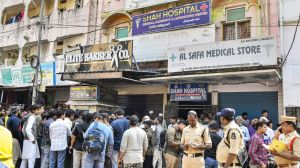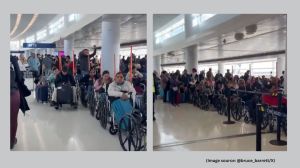Mailman Delivers Normality
When Sandra Bowling saw James Gath walking down Decatur Street in the French Quarter at New Orleans the other day, she was so excited that s...

When Sandra Bowling saw James Gath walking down Decatur Street in the French Quarter at New Orleans the other day, she was so excited that she bounded out of the Angeli Cafe, ran out the door and hugged him. ‘‘How you doing, honey?’’ Gath asked Bowling. ‘‘Oh, I’ve missed you,’’ Bowling replied. Gath is her mailman.
‘‘I’ll never take mail for granted again,’’ said Bowling, a hotel concierge. ‘‘When I got my first delivery back again, I was so happy, even though it was a bunch of bills.’’
‘‘It felt like some important degree of normality was returning to my life,’’ Bowling said. “It was reassuring. … This little chime really did go off in my head: ‘You’ve got mail!’”
Normality is still way off for most mail routes in New Orleans, where neighborhoods are so damaged and residents so dispersed by Hurricane Katrina that home delivery is pointless, even impossible. But the United States Postal Service is doing its best to move the mail. It is making deliveries, if sporadically, to about 38 per cent of its routes in New Orleans—including Gath’s circuit.
It has established mail pickup locations for every ZIP code representing a flood-damaged area, with several covered by a large complex of trailers and mobile vending sites at a parking lot next to the Superdome. It also is processing a huge volume of mail-forwarding requests from the 325,000-household post-Katrina diaspora. Gath—a muscular ex-Marine who rode out the storm with relatives in Louisiana, and came home to find two rental units he owns in ruins and his apartment plagued by mold and leaks—said he felt like ’’one of the lucky ones” to be back at his job.
In ordinary times, Gath delivered mail to residents and businesses in the eastern section of the French Quarter, past walk-up outdoor bars and stores that sell items such as fake blood, Mardi Gras beads and ‘voodoo gear’. As he made his rounds after the storm, grateful customers greeted him by name. An eight-year postal service employee with a friendly laugh, Gath not only stops and chats with folks he delivers mail to—he lives among them.
‘‘I got nobody to complain to about not getting my mail,’’ he said. ‘‘If I want to say, ‘Hey, where’s my check?’ I basically have to gripe to myself.’’ Gath says flashes of New Orleans’ devil-may-care spirit are slowly returning to his 12-square-block delivery area. But the atmosphere is largely sombre, and reunions are often emotional. The other day, Gath had just parked his mail truck on Decatur Street, loaded stacks of mail into his blue Postal Service bag and started his rounds when a woman came up and hugged him. ‘‘I just got back, and boy am I happy to see you!” said Maida Torres, a French Quarter resident whose occupation is “whatever I feel like doing”.
After Katrina struck, Torres had spent her first two nights at a former prison camp-turned-shelter in Tennessee, then spent seven weeks with a family there. She returned to New Orleans about two weeks ago. Seeing Gath, she said, felt like a part of the fabric of her life was coming back together. ‘‘He’s a good mailman,” she said, squeezing Gath on the elbow.
Dave Lewin, a postal service spokesman, said there were about 4,000 employees in the New Orleans area before Katrina. Although there are no exact figures on how many have returned to their jobs, the estimate is that it is a bit less than 50 per cent in the city, and a bit more in the surrounding areas. To expedite service here, the post office is delivering only first-class, priority and express mail to some areas.
Gath said that if it looked like no one was around at a particular location, he would attempt delivery for 10 days; if the intended recipient was still not there and had not filed a change-of-address form, he said, the mail would be returned to its sender. Following this procedure, he said, he is delivering only about half the normal amount of mail.
But it’s an important start to recovery. ‘‘I feel like I’m a part of that,’’ said Gath, who confessed to loneliness in the post-Katrina world: His three sisters have relocated to Houston, perhaps for good, and many friends are gone. “It’s tough,” he said, adding his job helps him keep going. “I like being back in the rhythm of delivering the mail. It’s a connection. It helps take my mind off of everything that’s been lost.’’
LAT-WP





- 01
- 02
- 03
- 04
- 05


























